6 Degrees of Separation: From How to Do Nothing to The History of Mischief
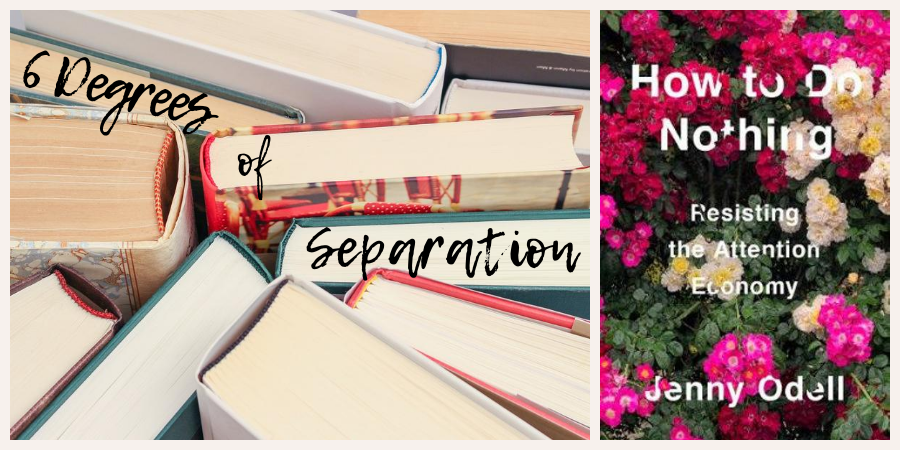
Welcome to this month’s Six Degrees of Separation.
For anyone interested in history, the term ‘six degrees of separation’ was originally inspired by Hungarian writer and poet Frigyes Karinthy, who coined the phrase in his 1929 short story ‘Chains‘. It’s the idea that everyone in the world is separated from everyone else by just six connections. It later became the title of a play and subsequent film based on the same idea.
Now, we have a bookish version of Six Degrees of Separation, and everyone is welcome to join. Simply start with the same book title as other readers (provided by Kate from booksaremyfavouriteandbest) and see what connections and links your weird and wonderful mind makes for you.
This month’s starting book is How to Do Nothing: Resisting the Attention Economy by Jenny Odell.

When COVID-19 first hit Australia and we all went into the initial lockdown, I did slow down, as events and other commitments were cancelled, and once I’d dealt with the anxiety I felt, I actually enjoyed spending time in my garden and reading more. I was a bit sad when my diary started booking up again, although I am very aware of how fortunate we are here in Western Australia, so I am simply being grateful for everything I do get to do, for as long as it lasts. Still, I’d be keen to learn ‘how to do nothing’ better. However, I’ve seen mixed reviews about the book, so I’m not sure whether to read it or not.
The title of How It Feels to Float starts with the same word as How to Do Nothing. I haven’t read this debut novel by Helena Fox either, but it has had excellent reviews and is definitely on my TBR pile. How to Float focuses on a girl dealing with grief and mental illness, and won the 2020 Victorian Premier’s Literary Award in the YA category.
The Protected by Claire Zorn also deals with grief and mental health. My teenage daughter and I both loved this book, and I will be interested to see how similarly or differently the two authors deal with similar ideas.
In a recent Radio National interview, I discovered that although The Protected wasn’t Zorn’s first book published, it was the first one she wrote. Zorn’s debut novel was instead The Sky So Heavy, which my daughter and I also thought was wonderful. This book is set in the Blue Mountains in New South Wales in a dystopian future following a nuclear fallout.

On my bookshelf currently, these two books of Zorn’s sit either side of Catch a Falling Star by Meg McKinlay. Set in 1979 when the US space station Sky Lab was hurtling to earth, this beautifully written story about 12-year-old Frankie navigating that period between childhood and adolescence will make you laugh, it will make you cry and, if you grew up in the 1970s, it might take you back to where you were when Sky Lab crashed on Australian soil.
Going further back in time is Goldfields Girl by Elaine Forrestal. Based on the early life of a real girl, this is the story of Clara Saunders, who traveled to the Goldfields with her family in the 1890s.
Goldfield Girls is published by Fremantle Press, which is about to release The History of Mischief by Rebecca Higgie, about two sisters who discover a strange book hidden beneath the floorboards of their grandmother’s house. The book opens up a world of mystery, mischief and secrets. This book won the inaugural Fogarty Literary Award for a Western Australian writer under 35, and I can’t wait to read it.

Knowing that many readers of this blog are either young writers or their teachers and parents, I deliberately chose books written for children or young adults. My chain began with fiction set in contemporary times (although pre-COVID!) before traveling back in time and finishing with a book I suspect will take us to all manner of eras. In retrospect, many of these books have also appeared in previous Six Degrees of Separation posts, which just goes to show how much some of these books have stayed with me.
Where might Six Degrees of Separation take you?
If you’re a young writer or reader, you can play along too.
And if you’re a teacher, perhaps you can have some fun with your class and help them discover a little about the way their minds make links and connections. I’d love to hear some of the chains!
If you’d like to check out where Six Degrees led other readers this month, then check out the links on Kate’s post.
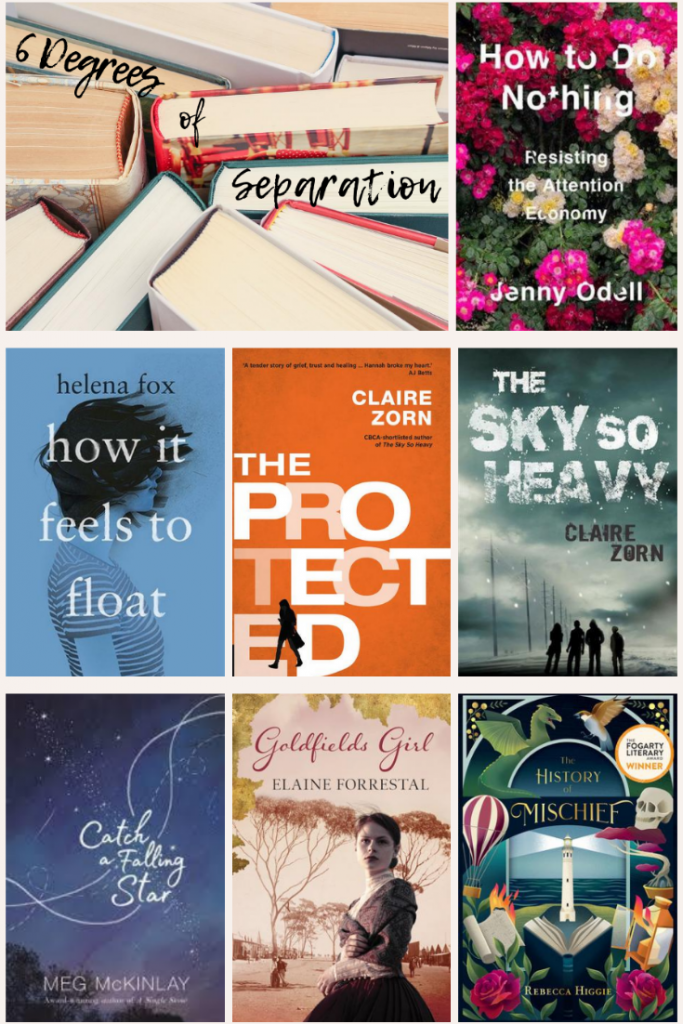

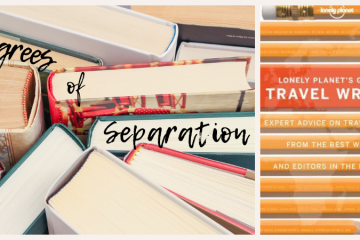
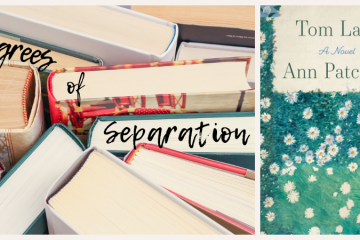
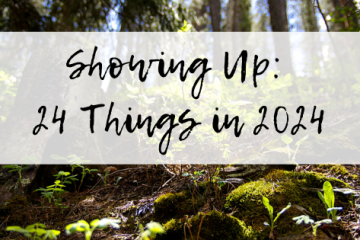
What a great first leap and from there you were off! Nicely worked. 🙂
It was after I made that first connection (which was genuinely the first book I thought of) that I decided to take the kids/YA path. 🙂
I really enjoyed your chain – and tho I haven’t read these authors/or books, I will be adding them to my TBR list.
I really did hope that some of these books would appeal to others. Did any particular titles stand out for you?
I obviously have to add How it Feels to Float and The Protected to my TBR list (I do like books with a grief theme, much to the wonder of my family who, while I’m crying, say ‘Why do you read this stuff?!’).
I am well and truly sick of having nothing in my diary and I fear that the situation in Melbourne will remain as is (or perhaps with tighter restrictions) for months to come.
I am very conscious that the situation is terrible in so many places, and I do wonder how long it will remain good here. I really am thinking of you over there. Stay safe. x
I didn’t know that was the first use of 6 degrees – I just knew it from the Hollywood connection.
I loved your first link on How to title, but not being much into YA, I don’t know any of these books but there are some interesting sounding ones there.
I confess I only knew the Hollywood connection until I started participating in this bookish version of it!
Oh… you connected two books by their publisher! What a great idea. I’ll have to keep that in mind. Thanks!
I wouldn’t normally think to make that connection, but Fremantle Press is based here in Western Australia and so it’s familiar to me (partly because they also published my book!). But I may seriously consider the connection again now that you’ve highlighted it. 🙂
Great chain – and as I don’t read many YA or children’s books, all of these are new to me. I love the sound of The History of Mischief!
So do I!
Nice work!
Thanks!
I have a piece of Skylab somewhere!
Thanks for sharing your chain.
Were you living near where it landed or did you get it some other way?
Oh my goodness, it doesn’t happen all that often, but you have really stumped me this time – I haven’t heard of any of the books in your chain! But I have to admit Catch a Falling Star does sound tempting!
I loved Catch a Falling Star! I think I enjoyed the trip down memory lane, but the story itself is wonderful.
You are right! This is actually a great idea to do this with class. I’m a school librarian in South Africa and we are not allowed to have our libraries open yet, but I will do this with the kiddies as soon as they can return.
Luckily, I can take part in the mean time and I will try to join every month. You’ve listed some great books here. Love how your chain links up as well.
Hope you will have a wonderful weekend.
Please let me know when you do this with your students! And if there’s anyway I can get involved and show my support or say hi to them, please let me know! I hope you and your students all stay safe. x